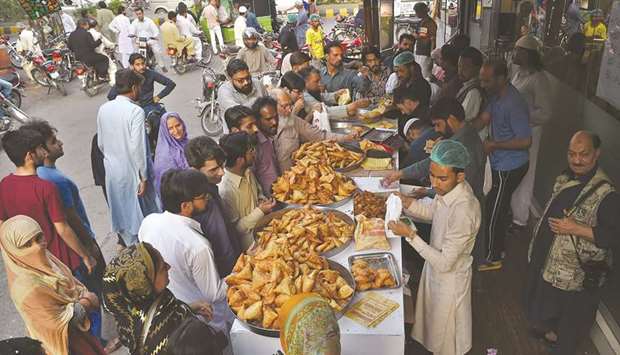Consumers are bracing for a costlier Ramadan this year as prices of almost all essential items, including meat, ghee, cooking oil, flour, onion, chicken, and fruits, have seen a significant increase in the past few weeks.
Meat sellers have increased prices by Rs20-50 per kg – depending on the localities, as retailers previously selling veal at Rs500 per kg, are now charging Rs520-540, whereas boneless meat is now being sold at Rs620-640 (Rs600 per kg, previously).
Mutton dealers have also increased prices to Rs1,000 (from Rs950) per kg, attributing the hike to rising wholesale prices.
Meat retailers have made it an annual ritual of raising prices just days ahead of the holy month, while municipal authorities watch the situation from the sidelines, leaving consumers at the mercy of exploitative retailers.
“When every item’s rate is going up, then why not red meat,” a retailer in Federal B Area commented, adding that “if food inflation has hit the consumers hard, then it has also (affected) our cost of living”.
There was no respite in chicken rates either, as some dealers have begun charging as high as Rs380-390 per kg, though others have maintained their prices at Rs350-360 per kg.
In the last week of March, chicken meat was selling for between Rs310 and Rs320 per kg.
Joining the trend, bread manufacturers, after a gap of five years and four months, also raised the prices by over 8% last month.
Mini-bread – plain and milky – now costs Rs30 and Rs31, compared with Rs27 and Rs28, respectively.
The price of small bread has been increased to Rs50 and Rs51 against Rs45 and Rs46 respectively, whereas the large plain bread is now available for Rs90 (Rs80 previously).
A four-piece pack of burger buns is now available for Rs45 (Rs40 before) as manufacturers complained that rising utility bills, increasing price of raw material, labour wages, transportation charges and high cost of imported ingredients owing to rupee devaluation against the dollar have compelled them to revise their rates upward.
A leading butter manufacturer, without citing any reason, increased prices last month: packs of 25g, 50g, 100g and 200g of butter are now sold for Rs20, Rs40, Rs80, and Rs160, compared with Rs15, Rs30, Rs60, and Rs120 earlier.
Karachi Wholesalers Grocers Association patron-in-chief Anis Majeed said that prices of various food items in Jodia Bazar – the country’s largest wholesale market – had not been increased the way the rupee had devalued against the dollar, followed by higher transportation charges.
“Consumers may see more price hikes in view of recent rise in diesel rates,” he warned.
Among non-perishable items, millers raised flour prices twice just days ahead of Ramadan, citing the minor damage to wheat crop in Punjab, coupled with quality damage owing to rains.
Furthermore, sugar prices have also risen to Rs70 per kg (from Rs65 per kg) following persistent rise in wholesale rates at Jodia Bazaar.
In January, a 1kg packet of sugar was available at Rs55.
The demand for the sweetener goes up exponentially in summers as it is extensively used in preparation of traditional drinks, syrups, juices and confectioneries during Ramadan.
Amongst vegetables, prices of onion – the most sought-after item in Ramadan – witnessed a 100% jump in price, to Rs60 per kg from Rs30 per kg in March, while it was priced Rs40-50 in April.
Some push-cart owners are even demanding Rs70 per kg.
On the other hand, clever ghee and cooking oil manufacturers announced a relief of Rs5 per kg/litre for Ramadan after increasing prices by Rs20 per kg/litre in the past two months.
Good quality cooking oil and ghee now costs Rs200 per litre, after a jump of Rs20; two months ago it was being sold at Rs180 per litre.
Justifying the price hike, manufacturers believe that government had increased the federal excise duty on palm oil import by 1% and other taxes followed by rising cost of imports on account of persistent fall in rupee’s value against the dollar.
Ghee and cooking oil prices had risen amid declining trend in palm oil rates in world market.
It may be noted here that world rates of various items have fallen in the first nine months for the 2019 fiscal year compared with the same period in the last fiscal year, but consumers have been taken on a costly ride.
For example, the average per tonne price of palm oil dropped to $596 from $729.
Dates, which are traditionally used to break fasts during Ramadan, have also seen their prices increase during the last two months.
Various varieties of dates have already become costlier: for example, Muzafati dates are being sold at Rs300-400 per kg compared to Rs200 last year.
Iranian dates now cost Rs200-250 (Rs150-170 per kg last year).
Melon rates hover between Rs60-80 per kg, when they were easily available for Rs40-50 per kg last month.
There was no change in rates of banana, which are being sold at Rs80-100 per dozen for the last two months.
Local apple carries price tag of Rs150-200 per kg, showing no change in the last two months.

Pakistanis buying Iftar food in Rawalpindi.
